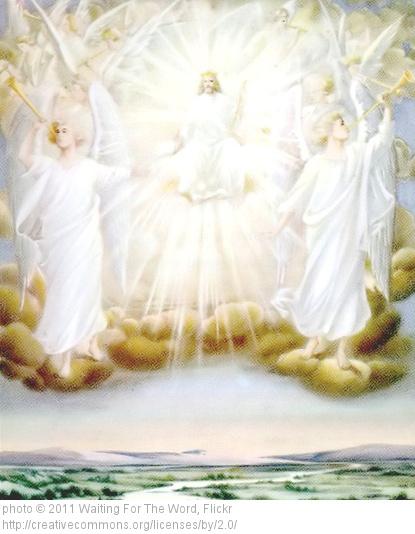Grace Thoughts
God’s Judgment: How It Works – Part 23

We started this special series about how God’s Judgment works six years ago. One year ago, we started looking at the phrase, “Day of the Lord.”
We move now to how the New Testament writers addressed this unique Day in the history of the world.
‘Day of the Lord’ in the New Testament
The Apostle Peter first used the phrase “day of the Lord” in his sermon on Pentecost. It was Peter’s first use of quoting Scripture in the sermon, so that’s significant.
The sun shall be turned into darkness, And the moon into blood, Before the coming of the great and awesome day of the Lord. Acts 2:20
Here’s the full quote from Peter:
‘And it shall come to pass in the last days, says God, That I will pour out of My Spirit on all flesh; Your sons and your daughters shall prophesy, Your young men shall see visions, Your old men shall dream dreams. And on My menservants and on My maidservants I will pour out My Spirit in those days; And they shall prophesy. I will show wonders in heaven above And signs in the earth beneath: Blood and fire and vapor of smoke. The sun shall be turned into darkness, And the moon into blood, Before the coming of the great and awesome day of the Lord. And it shall come to pass That whoever calls on the name of the Lord Shall be saved.’ Acts 2:17-21
As we saw in the last part of our series, the Day of the Lord is not a literal 24-hour day. It’s a period of time where God will judge Israel and the world. Peter quoted Joel to remind Israel of what would happen before the coming of the great and awesome “day of the Lord.”
Peter began his sermon by saying this:
But Peter, standing up with the eleven, raised his voice and said to them, ‘Men of Judea and all who dwell in Jerusalem, let this be known to you, and heed my words. For these are not drunk, as you suppose, since it is only the third hour of the day. But this is what was spoken by the prophet Joel:” Acts 2:14-16
Peter seemed to be saying that the event people witnessed in the streets of Jerusalem on Pentecost in the 1st century AD were the fulfillment of Joel’s prophecy hundreds of years earlier. Joel’s theme was “the Day of the Lord” and had both “near” and “far” implications. God’s judgment of Israel for sin has occurred in the past (historical) and will occur in the future (eschatological). God will also unleash His wrath and judgment on other nations. Peter looked back at Joel’s prophecy and announced that a portion of the prophecy was being fulfilled in the presence of those listening to Peter speak. God was pouring out His Spirit on His people and they were prophesying and seeing visions.
When the Day of Pentecost had fully come, they were all with one accord in one place. And suddenly there came a sound from heaven, as of a rushing mighty wind, and it filled the whole house where they were sitting. Then there appeared to them divided tongues, as of fire, and one sat upon each of them. And they were all filled with the Holy Spirit and began to speak with other tongues, as the Spirit gave them utterance. Acts 2:1-4
Jesus had told His disciples to “wait for the Promise of the Father” and that they would “receive power when the Holy Spirit has come upon you; and you shall be witnesses to Me in Jerusalem, and in all Judea andSamaria, and to the end of the earth” (Acts 1:4, 8).
Joel’s Prophecy
Here’s a small example from Joel’s prophecy. It’s a short Book, so you can read through it in less than ten minutes. Joel’s prophecy, as with other Old Testament prophecies, had the Lord Jesus in view.
Blow the trumpet in Zion, And sound an alarm in My holy mountain! Let all the inhabitants of the land tremble; For the day of the Lord is coming, For it is at hand. Joel 2:1
The Lord gives voice before His army, For His camp is very great; For strong is the One who executes His word. For the day of the Lord is great and very terrible; Who can endure it? Joel 2:11
The sun shall be turned into darkness, And the moon into blood, Before the coming of the great and awesome day of the Lord. Joel 2:31
Multitudes, multitudes in the valley of decision! For the day of the Lord is near in the valley of decision. Joel 3:14
The Apostle Peter used the phrase many years later when he wrote his second letter.
But the day of the Lord will come as a thief in the night, in which the heavens will pass away with a great noise, and the elements will melt with fervent heat; both the earth and the works that are in it will be burned up. Therefore, since all these things will be dissolved, what manner of persons ought you to be in holy conduct and godliness, looking for and hastening the coming of the day of God, because of which the heavens will be dissolved, being on fire, and the elements will melt with fervent heat? Nevertheless we, according to His promise, look for new heavens and a new earth in which righteousness dwells. 2 Peter 3:10-13
The Apostle Paul used the phrase in his first letter to the Thessalonians. It’s obvious from what Paul wrote that those Christians were already familiar with the “day of the Lord.”
But concerning the times and the seasons, brethren, you have no need that I should write to you. For you yourselves know perfectly that the day of the Lord so comes as a thief in the night. For when they say, ‘Peace and safety!’ then sudden destruction comes upon them, as labor pains upon a pregnant woman. And they shall not escape. 1 Thessalonians 5:1-3
Day of Judgment
Jesus used a similar phrase when He spoke of the “day of judgment.”
Assuredly, I say to you, it will be more tolerable for the land of Sodom and Gomorrah in the day of judgment than for that city! Matthew 10:15
But I say to you, it will be more tolerable for Tyre and Sidon in the day of judgment than for you. Matthew 11:22
But I say to you that it shall be more tolerable for the land of Sodom in the day of judgment than for you. Matthew 11:24
But I say to you that for every idle word men may speak, they will give account of it in the day of judgment. Matthew 12:36
Peter used the phrase “day of judgment” twice prior to using “day of the Lord” in his second letter.
For if God did not spare the angels who sinned, but cast them down to hell and delivered them into chains of darkness, to be reserved for judgment; and did not spare the ancient world, but saved Noah, one of eight people, a preacher of righteousness, bringing in the flood on the world of the ungodly; and turning the cities of Sodom and Gomorrah into ashes, condemned them to destruction, making them an example to those who afterward would live ungodly; and delivered righteous Lot, who was oppressed by the filthy conduct of the wicked (for that righteous man, dwelling among them, tormented his righteous soul from day to day by seeing and hearing their lawless deeds)— then the Lord knows how to deliver the godly out of temptations and to reserve the unjust under punishment for the day of judgment, and especially those who walk according to the flesh in the lust of uncleanness and despise authority. 2 Peter 2:4-10
Beloved, I now write to you this second epistle (in both of which I stir up your pure minds by way of reminder), that you may be mindful of the words which were spoken before by the holy prophets, and of the commandment of us, the apostles of the Lord and Savior, knowing this first: that scoffers will come in the last days, walking according to their own lusts, and saying, ‘Where is the promise of His coming? For since the fathers fell asleep, all things continue as they were from the beginning of creation.’ For this they willfully forget: that by the word of God the heavens were of old, and the earth standing out of water and in the water, by which the world that then existed perished, being flooded with water. But the heavens and the earth which are now preserved by the same word, are reserved for fire until the day of judgment and perdition of ungodly men. 2 Peter 3:1-7
The Apostle John also used the phrase “day of judgment.”
Love has been perfected among us in this: that we may have boldness in the day of judgment; because as He is, so are we in this world. There is no fear in love; but perfect love casts out fear, because fear involves torment. But he who fears has not been made perfect in love. 1 John 4:17-18
As did the Lord’s half brother Jude.
But I want to remind you, though you once knew this, that the Lord, having saved the people out of the land of Egypt, afterward destroyed those who did not believe. And the angels who did not keep their proper domain, but left their own abode, He has reserved in everlasting chains under darkness for the judgment of the great day; as Sodom and Gomorrah, and the cities around them in a similar manner to these, having given themselves over to sexual immorality and gone after strange flesh, are set forth as an example, suffering the vengeance of eternal fire. Jude 1:5-7
[Listen to a Podcast of this study by clicking this link.]
Next Time
Whichever view you take of when God will judge the world, it is certain that Divine Judgment is coming. We will see what “Day of Judgment” will look like in the next part of our special series “God’s Judgment: How It Works.”
Judgment and Justice
God’s future judgment will be based on His justice. That’s why we have connected this series with a new one titled “God’s Justice: How It Works.” You can read the first part of that series here.
If you have not read all of the parts of this study we’ve published so far, we invite you to do that now for the Scriptural background to Christ as Judge.
- Part One
- Part Two
- Part Three
- Part Four
- Part Five
- Part Six
- Part Seven
- Part Eight
- Part Nine
- Part Ten
- Part Eleven
- Part Twelve
- Part Thirteen
- Part Fourteen
- Part Fifteen
- Part Sixteen
- Part Seventeen
- Part Eighteen
- Part Nineteen
- Part Twenty
- Part Twenty One
- Part Twenty Two
Scripture taken from the New King James Version®. Copyright © 1982 by Thomas Nelson. Used by permission. All rights reserved.
Copyright © 1990-2025
 Christian ApologeticsDay of the LordGod's JudgmentJesus Christ
Christian ApologeticsDay of the LordGod's JudgmentJesus Christ

Published by gracelifethoughts
Founder & Director of GraceLife Ministries View all posts by gracelifethoughts
